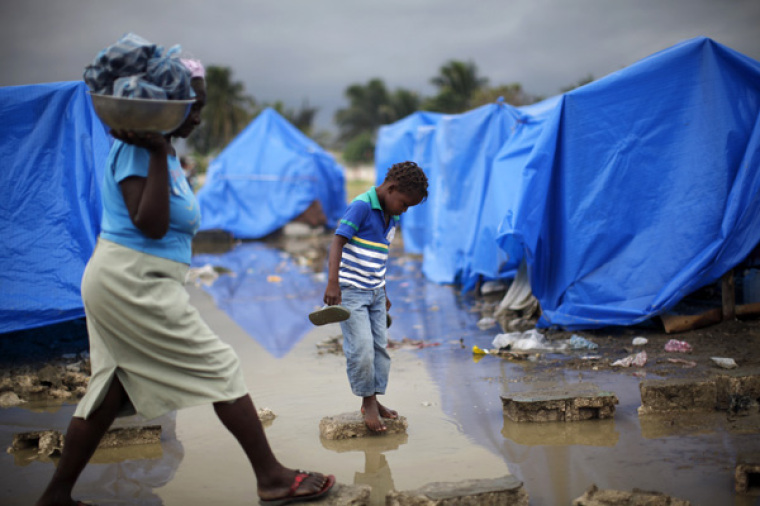Over 80,000 Haitians Still Homeless 5 Years After Massive Quake

More than 80,000 Haiti nationals are still living in more than 100 refugee camps five years after a 7.0-magnitude earthquake destroyed the country's capital Port-au-Prince, an international rights group said.
In a report titled "15 minutes to leave: Denial of the right to adequate housing in post-quake Haiti" released this month, Amnesty International reported that 22,741 households with 85,432 people are still living in makeshift displacement camps as of September 2014.
The U.K.-based group noted that 19 percent of them face a risk of forced eviction, noting that "majority of people who have left the camps have not benefitted from durable housing solutions, especially those who did not own land or a house before the earthquake."
"Although the number of people living in displacement camps remains large, it represents a decrease of more than 90 percent since July 2010. However, the numbers tell only part of the story," the report said.
The majority of people who were forcibly evicted were not offered an alternative location where they could resettle. This leaves them with no choice but to move to other camps or to settle in the informal settlement known as Canaan on the outskirts of Port-au-Prince, it added.
"Five years ago the eyes of the world were on Haiti after the devastating earthquake tore lives apart and left more than two million people homeless. Sadly, since then the world's interest has waned while tens of thousands of people remain destitute and homeless," researcher Chiara Liguori said, according to Sputnik.
However, the group clarified that mechanisms have been developed to provide some assistance retrospectively to forcibly evicted families, mainly through the allocation of rental subsidies only last year.
Meanwhile, several groups lamented that the figures show how donors, including the U.N., have failed the survivors of the impoverished country.
The Bureau des Avocats Internationaux in Haiti criticized the U.N. for failing to respond to a subsequent cholera epidemic, which the group said affected more than 720,000 Haitians and killed 8,700 others.
Mario Joseph said the cholera epidemic was an excellent sincerity test for the U.N., and the U.N. has flunked that test," said Joseph in a statement.
"Cholera is a man-made disaster that could have been easily avoided by minimally adequate sanitation at the U.N. bases, or stopped with 19th Century technology," Joseph said.
The ongoing Haiti cholera outbreak, which began in mid-October 2010 is considered as the worst cholera epidemic in recent history by the U..S Center for Disease Control and Prevention.
On Jan. 12, 2010, a 7.0-magnitude earthquake ripped through the heart of Haiti, the poorest country in the Americas, affecting three million people with estimated deaths of from 220,000 to 316,000.
 Christians don't have to affirm transgenderism, but they can’t express that view at work: tribunal
Christians don't have to affirm transgenderism, but they can’t express that view at work: tribunal Archaeology discovery: Medieval Christian prayer beads found on Holy Island
Archaeology discovery: Medieval Christian prayer beads found on Holy Island Presbyterian Church in America votes to leave National Association of Evangelicals
Presbyterian Church in America votes to leave National Association of Evangelicals Over 50 killed in 'vile and satanic' attack at Nigerian church on Pentecost Sunday
Over 50 killed in 'vile and satanic' attack at Nigerian church on Pentecost Sunday Ukrainian Orthodox Church severs ties with Moscow over Patriarch Kirill's support for Putin's war
Ukrainian Orthodox Church severs ties with Moscow over Patriarch Kirill's support for Putin's war Islamic State kills 20 Nigerian Christians as revenge for US airstrike
Islamic State kills 20 Nigerian Christians as revenge for US airstrike Man who served 33 years in prison for murder leads inmates to Christ
Man who served 33 years in prison for murder leads inmates to Christ


 Nigerian student beaten to death, body burned over ‘blasphemous’ WhatsApp message
Nigerian student beaten to death, body burned over ‘blasphemous’ WhatsApp message 'A new low': World reacts after Hong Kong arrests 90-year-old Cardinal Joseph Zen
'A new low': World reacts after Hong Kong arrests 90-year-old Cardinal Joseph Zen Iran sentences Christian man to 10 years in prison for hosting house church worship gathering
Iran sentences Christian man to 10 years in prison for hosting house church worship gathering French Guyana: Pastor shot dead, church set on fire after meeting delegation of Evangelicals
French Guyana: Pastor shot dead, church set on fire after meeting delegation of Evangelicals ‘Talking Jesus’ report finds only 6% of UK adults identify as practicing Christians
‘Talking Jesus’ report finds only 6% of UK adults identify as practicing Christians Mission Eurasia ministry center blown up in Ukraine, hundreds of Bibles destroyed: 'God will provide'
Mission Eurasia ministry center blown up in Ukraine, hundreds of Bibles destroyed: 'God will provide' Church holds service for first time after ISIS desecrated it 8 years ago
Church holds service for first time after ISIS desecrated it 8 years ago Burger King apologizes for 'offensive campaign' using Jesus' words at the Last Supper
Burger King apologizes for 'offensive campaign' using Jesus' words at the Last Supper Uganda: Muslims abduct teacher, burn him inside mosque for praying in Christ’s name
Uganda: Muslims abduct teacher, burn him inside mosque for praying in Christ’s name